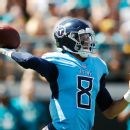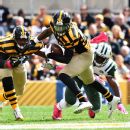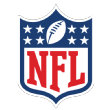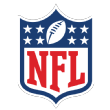-

Brady HendersonESPN
RENTON, Wash. — Doug Baldwin insists he’s “ready to go” now that he has sufficiently healed from the knee injury that sidelined — and frustrated — him for the past two weeks.
The Seattle Seahawks’ No. 1 receiver is hoping the team’s training staff agrees with him. He knows that will be the ultimate determination of whether he plays Sunday against the Arizona Cardinals.
“Again, that’s going to be their call,” said Baldwin, who was listed as a limited participant for the second straight day. “There’s a lot of things that go into it, obviously the precautionary reasons of making sure that I’m healthy fully, so that I can go for the rest of the season, not just this game. And I get that. But as a competitor and somebody that hasn’t missed games that often, who had an 89-game streak, I feel like I know my body pretty well, so I feel like I’m ready to go.”
Baldwin returned to practice this week for the first time since suffering an MCL sprain early in Seattle’s opener at Denver. That relegated him to a spectator for the second half of that game, and the Seahawks’ Monday night loss in Chicago dropped them to 0-2.
He called it “really frustrating” to not be able to play and said that emotion, among other things, was at play when he lost his cool on the sideline during the Seahawks’ win over the Cowboys. The Fox broadcast showed a fired-up Baldwin talking passionately with the team’s co-director of player personnel, Trent Kirchner. He said he apologized to Kirchner a few minutes later and that the two are fine.
“It was empathy, is what it was,” Baldwin said. “I won’t go into a great deal of detail but essentially it’s frustrating when you start 0-2 and you start the way we’ve started. We’ve had some frustrating games. And especially as a receiving corps, being here for so long and knowing the process and knowing what you guys are going to say, the questions that come up in the receivers room, and how that plays a role in just the emotional stability of the receivers and then just other things that come along with that, so when they come off the field and they’re telling me how they’re feeling and they’re expressing their emotions and myself, trying to be empathic to them in that regard, there’s a lot of energy there.
“On top of the fact that I’m not able to go out there and help them out and play with them, on top of the fact that there’s history, there’s a lot there. I think that was just an exertion of energy that Trent just happened to be in the area at the time unfortunately. I sent him a text message and I just told him — well, during the moment I came back to him and said, ‘Look, man, I’m sorry. I just had to let get that out.’ And he’s like, ‘I get it. I get it.’ He knows. He understands. So we had a good conversation about it. That’s my guy, though.”
Baldwin had missed a month of training camp because of an injury to his other knee before he suffered the MCL injury in Denver. That snapped his streak of 89 consecutive games played, which had been the fourth longest among active receivers. He returned later in the first half before realizing he had to take himself out.
“In that moment, it was one of those situations where, ‘OK, Doug, it’s messed up, you know it’s messed up but let’s see what you can do,'” he said. “I knew it was a serious injury, but just again, being out for so long prior to that game I wanted to do everything I could to go back in and I did that, realized that it wasn’t getting better so I had to pull myself unfortunately. It’s just the nature of the business, but the reasoning for going back out there was really just the competitive nature in my mind.”
Baldwin said his other knee is doing better with the extra time off it has had to rest.
“Knowing that I have a lot of mileage on my legs, knowing that I’m not 25 years old any more, I take all that context into account when I’m making my decisions as well,” he said. “The process of getting my body to this point has been obviously a long process, but I know where I’m at. And of course I have to tell [coach Pete Carroll] and anybody who asks me how confident I am. But that’s just the truth. I think all of you all know when I come up here, you’re not going to get BS from me. I’m going to be honest with you. And I’ll say the same thing to Pete and anybody else who asks me about my health. I’m ready to go, so we’ll see what happens. I think we have a good plan in place and I’m willing to go with that so we’ll see what happens.”
In other developments Thursday, free safety Earl Thomas was a full participant after getting what the team said was a rest day Wednesday.










 Everything you need this week:
Everything you need this week: